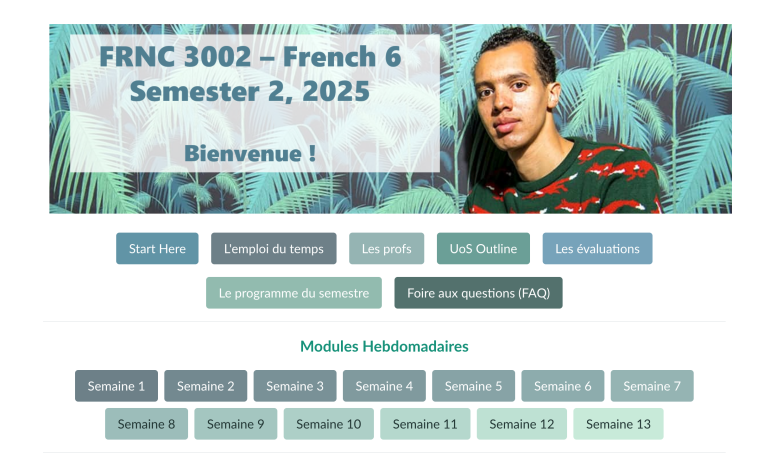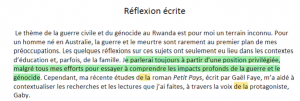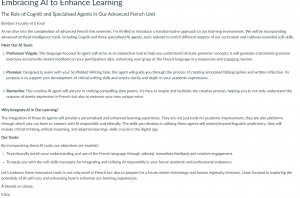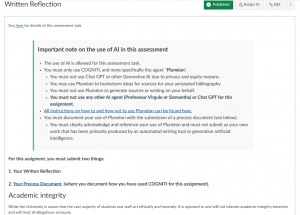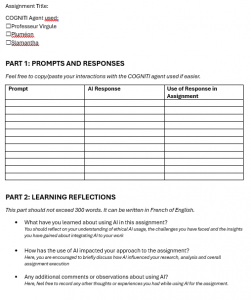Intercultural literacy is both a key part of one of Sydney’s graduate qualities, cultural competence, and of our teaching in the School of Languages and Cultures. Defined as “adequate or relevant knowledge about particular cultures, integrating a range of complex cultural knowledge”, intercultural literacy is core to the ability to “effectively interact and collaborate with individuals from different cultural contexts” (Henshaw, 2022)After the French and Francophone Studies major underwent a pivotal restructure in 2021, the creation of two effective core units FRNC3001 French 5 and FRNC3002 French 6 gave us the opportunity to approach the development of this skill through curriculum decolonisation.
Curriculum decolonisation in French
Curriculum decolonisation means that our curriculum becomes not just about language acquisition, it also serves as a platform to explore what it means to be French or French-speaking in the contemporary world. This exploration inevitably leads to both confronting and understanding France’s colonial past and its lasting impacts on Francophone societies. It also means questioning global representations of what a French speaker is today. Too often textbooks and curricula present a narrow representation of the French speaker as white, privileged, monolingual, and Parisian, thereby invisibilising the diversity of the French-speaking world (Bouhamer and Bourdeau, 2022, p. 7)
In our approach, decolonising the curriculum involves highlighting the underrepresented voices and narratives that shape today’s French and Francophone societies. In French 5 we look at France’s colonial past through the impact of the Algerian War and uprising in New Caledonia on French and Francophone societies today through authentic materials showcasing voices that are not typically heard in these spaces. In French 6, we use the works of Franco-Rwandan writer and hip-hop artist Gaël Faye to understand the impact of colonisation and the genocide against the Tutsi in Rwanda in contemporary France (Petit Pays (Paris: Grasset, 2016) and the album « Pili-Pili sur un croissant au beurre », 2013). In this piece I’ll showcase how we fostered intercultural literacy and empathy in this unit and briefly outline how we attempted to meaningfully integrate Generative AI. In French 6, we use Universal Design for Learning (UDL) and Cultural Trauma Literacy to delve into these complex histories. We explore traumatic events through various mediums such as literature and music, providing a holistic view that fosters empathy and enhances understanding among students.
FRNC3002 French 6: A case-study
Before I go any further, I’d like to acknowledge that FRNC3002 French 6 was initially designed by my colleague Dr Carolyn Stott, who thought the materials and assessment structure through. When I took over the unit in 2023, I brought the emphasis on intercultural literacy, and the importance of empathy. In 2024, I started experimenting with AI.
Pedagogical design
In a unit centred around a novel that depicts the impact of the genocide against the Tutsi in Rwanda from the perspective of a child, it was paramount to frame the materials from a trauma-informed standpoint. The five core principles of trauma-informed pedagogy are safety, trustworthiness, choice, collaboration and empowerment (Guillén-Yparrea and Ramírez-Montoya, 2023). Students always have a choice in the materials. Each week we study a section of the novel in reference to the theme of the week and analyse a song from the artist’s album, as well as his commentary on the song. Supplementary materials are made available to the students, should they wish to pursue their exploration of the weekly theme. Sections interacting directly with the genocide and other sensitive passages are flagged in advance to the students, and more materials are made available during these weeks for students who choose not to engage with the text. Students always work collaboratively on these materials and they always have a choice to engage. Some choose to engage, some choose not to. Those who choose not to engage are provided with different sets of materials designed to achieve the same learning outcomes. This empowers the students and gives them more agency in the learning process.
This unit is also designed around UDL principles to provide multiple modes of representation for the students and allow for multiple modes of participation. In French 6 this is exemplified by the integration of diverse materials: whilst the novel we study is written in French, students are encouraged to also read the text in translation in their mother tongue (the text is widely available in translation). Additionally, author interviews, commentaries, and music from other artists exploring the same themes enrich the learning experience, making it more engaging and relatable.
Assessments tailored to encourage deep understanding and empathy
The assessment structure in French 6 is meticulously designed to reinforce the decolonisation of the curriculum and promote empathy:
Scaffolded Writing task (individual task)
Part 1: Annotated Bibliography. Students select a theme related to the novel studied—ranging from exile and immigration to the effects of war, multiculturalism and identity, to childhood and nostalgia, autobiography and autofiction —and research various sources. This task not only enhances their research skills but also deepens their understanding of the theme in both the context of the novel and their personal experiences.
Part 2: Written Reflection. Leveraging feedback from the annotated bibliography, students articulate their personal definitions of the chosen theme and relate these insights to the novel and their own lives. This reflective process is crucial for developing empathy and a nuanced understanding of complex cultural issues.
Slam Poetry Project (Group Task)
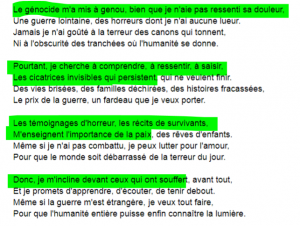
Part 1: Project Proposal. Students get to work on their slam poem and workshop potential titles, they divide tasks and nominate due dates to help with time management and group accountability
Part 2: Slam Poem Script. Each student submits their part of the slam poem script and one of the students, nominated in the project proposal, submits the entire poem. Students receive a group mark and an individual mark for this task.
Part 3: Slam Poetry Declamation. Students perform their slam poem in front of the class in week 13.
Assessment workshops
Assessment workshops are embedded into the weekly schedule for the unit enabling students to work on their assessments in class, and class content is tailored to develop skills needed for the assessment. For instance, the workshop for the written reflection included both work on vocabulary related to emotions and in-class discussions around the importance of knowing how to convey emotion when learning an additional language. In one of my tutorials this semester students also questioned the potential cultural taboo of expressing emotions and vulnerability in a higher education setting. In the workshop for the slam poem script students collaboratively worked on deconstructing and reformulating vocabulary to construct rhymes, and in the slam poetry performance workshop students worked on their gestures, more particularly on how they would develop gestures that enhance the meaning conveyed in their slam poetry.
Leveraging Generative AI to Enhance Learning
In semester 2, 2024, I decided to experiment with AI integration in this unit, to ascertain whether AI could be a valuable tool to help students succeed in tasks they found notoriously difficult (writing about their emotions and crafting a slam poem). To this end, I created three Cogniti agents:
- Professeur Virgule: This agent, focussed on grammar, serves as an interactive tool to help students grasp intricate grammatical concepts. It has been tailored to help students test their understanding of the grammatical concepts seen in class, to generate customised grammar practice, and to answer any grammatical questions the students may have.
- Pluméon: Designed to assist with the annotated bibliography and written reflection, Pluméon’s aim is to support the development of critical writing skills. It has been calibrated to not generate writing for the students, but rather help them brainstorm ideas about how best to express their ideas and adapt to the format of the written reflection.
- Slamantha: Slamantha is designed to assist students in crafting slam poetry based on the ideas expressed in their written reflections. Its aim is to inspire and facilitate the creative process and assist students in understanding the nuances of poetic expression in French.
The use of these agents was mandated for all submitted assessment tasks. In order to maximise AI integration in this unit, explanations and instructions were explicit and detailed:
Students were specifically graded on their use of these three tools, with 20% of the mark for each assessment set aside for this purpose. This was specifically outlined in assignment rubrics, and both the process document and students’ reflections on their learning were used to score these criteria.
Student reflections
In USS feedback students reported generally appreciating the use of AI. Some stated that it provided a level playing field, but others were also thrown by the mandated use of AI, highlighting that the process documents were time-consuming and detracted from the assessments. In response to this feedback, in the 2025 iteration of French 6 I integrated more explicit conversations around AI use to discuss not only why we use it and its importance, but also how these requirements create opportunities to explore both the benefits and limitations of AI in academic contexts.
Conclusion
The innovative pedagogical approach in FRNC3002 French 6 showcases a profound commitment to decolonising the curriculum and enhancing intercultural literacy. It also showcases the potential of curriculum development to nurture empathy. A meaningful and thoughtful AI integration not only enriches the learning experience, it also may break down the emotional connection that students develop with the themes they explore, making it easier for them to reflect. As a result, this integration equips students with transferrable skills, those needed to navigate and respect diverse cultural landscapes. This approach demonstrates how technology and educational foresight can work together to prepare students for a world where understanding and cultural cooperation across cultural boundaries are more crucial than ever.
Find out more about Cogniti
As you start exploring the use of Cogniti in your teaching practice, you may find the following helpful:
- Workshops on Cogniti: Come to a workshop to learn more and get hands-on experience
- Read how other educators are using Cogniti in their teaching at Teaching@Sydney
- Join the AI Community of Practice (CoP): Share experiences and learn from peers who are implementing Cogniti and other Generative AI in their teaching by joining the CoP

